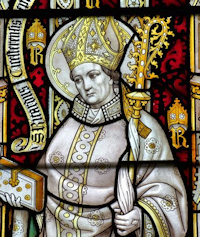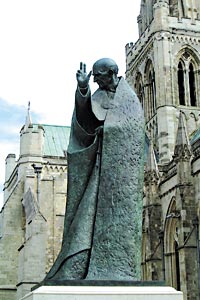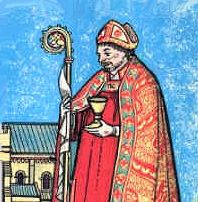Lent: April 3rd
Friday of the Fifth Week of Lent
Other Commemorations: St. Richard of Chichester, Bishop (RM)
» Enjoy our Liturgical Seasons series of e-books!
"I am the light of the world. Whoever follows me will not walk in darkness, but will have the light of life (Jn 8:12)." Like the forty days' fast of the Ninevites, our Lent continues in complete confidence in divine mercy; but our hope is founded not so much on our poor efforts at penance but on the passion of our Savior. No one is excluded from the redemption effected by the Blood of Christ; His grace is promised to all who believe in Him.
Historically today is the feast of St. Richard of Chichester also known as Richard de Wych, a saint canonized 1262 who was Bishop of Chichester.
Meditation
What do we do for the salvation of souls? It is true that we pray for one another, offer a few words of comfort, and do each other slight favors; but we do little more. Christ was more generous. He endured the crowning of thorns and dragged the heavy cross to Calvary. We pamper our bodies as if they were our last end. We prefer to have our heads crowned with laurels and roses. We are impatient and consider ourselves unfortunate whenever we are called on to carry a mere splinter of the cross of Christ. Are we one in spirit with Him?
Now, during Passiontide, we must begin to love and treasure pain and suffering. In the cross, in suffering, in our crucifixion with Christ, we shall find salvation. For Him and with Him we should bear all the slight injustices committed against us. For Him we should suffer freely and willingly the unpleasant and disagreeable things that occur to us. But our faith is weak. We flee from the cross instead of holding it dear, instead of loving it and welcoming it as our Savior did.
What St. Paul says of many Christians of his day is equally true of many in our time: "For many walk, of whom I have told you often (and now tell you weeping) that they are enemies of the cross of Christ. Whose end is destruction; whose God is their belly; whose glory is in their shame; who mind earthly things" (Phil. 3:18 f.).
—Excerpted from The Light of the World by Benedict Baur, O.S.B.
St. Richard of Chichester
 St. Richard was born in 1197 at Wiche, near Worcester, England. When quite young, he and his elder brother were left orphans. Richard gave up his studies in order to manage his brother's impoverished farms. He succeeded so well that his brother desired to make over the estate to him. Richard refused not only the estate, but the opportunity of a brilliant marriage, since he desired to give himself to God's service. He resumed his studies which he had begun at Oxford, then in Paris. Returning to England he won his Master of Arts at Oxford, and then went to Bologna, Italy, to study canon law.
St. Richard was born in 1197 at Wiche, near Worcester, England. When quite young, he and his elder brother were left orphans. Richard gave up his studies in order to manage his brother's impoverished farms. He succeeded so well that his brother desired to make over the estate to him. Richard refused not only the estate, but the opportunity of a brilliant marriage, since he desired to give himself to God's service. He resumed his studies which he had begun at Oxford, then in Paris. Returning to England he won his Master of Arts at Oxford, and then went to Bologna, Italy, to study canon law.
St. Edmund, Archbishop of Canterbury, appointed him his Chancellor, and he accompanied the Archbishop when he was banished to France. After his death, Richard retired to a convent of Dominican Friars in Orleans, France, where he was ordained Priest.
When Bishop Nevil of Chichester, England, was dying, King Henry III recommended an unworthy court favorite to the See. The Archbishop declared him unqualified and the presentation void. He preferred Richard of Wiche to that dignity. Richard was consecrated in 1245, but the King refused to recognize the election and seized the revenues of the See. Richard suffered many hardships and persecutions for two years, repaying with favors those who persecuted him. He pleaded his cause before Pope Innocent IV against the King's deputies, and obtained a confirmation of his election.
 St. Richard performed his episcopal duties with fervor and charity towards his flock, and thoroughly reformed his See. After two years his revenues were restored. He preached the word of God with that unction and fruitfulness which only an eminent spirit of prayer could produce. Penitent sinners he received with great tenderness and charity, but when the rights of the Church were questioned he remained obdurate, fearing no consequences.
St. Richard performed his episcopal duties with fervor and charity towards his flock, and thoroughly reformed his See. After two years his revenues were restored. He preached the word of God with that unction and fruitfulness which only an eminent spirit of prayer could produce. Penitent sinners he received with great tenderness and charity, but when the rights of the Church were questioned he remained obdurate, fearing no consequences.
While preaching a holy war against the Saracens, at the Pope's command, St. Richard fell ill. He foretold his death, dying in a hospital at Dover on April 3, 1253, at the age of fifty-six. His body was conveyed to Chichester for internment in the Cathedral before the altar he had erected. Miraculous cures occurred at his tomb. The Saint was solemnly canonized by Pope Urban IV in 1262.
—From Heavenly Friends: A Saint for Each Day by Rosalie Marie Levy
Patronage: coachmen; Sussex, England; city of Chichester, England; diocese of Chichester
Symbols and Representation: bishop with a chalice on its side at his feet because he once dropped the chalice during a Mass and nothing spilled from it; kneeling with the chalice before him; ploughing his brother’s fields; a bishop blessing his flock with a chalice nearby
Highlights and Things to Do:
- Read more about St. Richard:
- Chichester Cathedral had a shrine dedicated to St. Richard and was a center of pilgrimage. In 1538, during the reign of Henry VIII, the shrine was plundered and destroyed by order of Thomas Cromwell. See this site for more details about St. Richard's relics.
- Richard of Chichester is the patron saint of Sussex in southern England; since 2007, his translated saint's day of June 16 has been celebrated as Sussex Day.
- The prayer from which the Hymn "Day by Day" takes its lyrics is attributed to St. Richard:
Thanks be to my Lord Jesus Christ
for all the benefits thou hast given me,
for all the pains and insults thou hast borne for me.
O most merciful redeemer, friend and brother,
may I know thee more clearly,
love thee more dearly
and follow more nearly.






